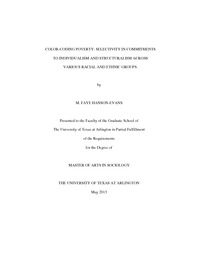
ATTENTION: The works hosted here are being migrated to a new repository that will consolidate resources, improve discoverability, and better show UTA's research impact on the global community. We will update authors as the migration progresses. Please see MavMatrix for more information.
Show simple item record
| dc.contributor.author | Hanson-Evans, M. Faye | en_US |
| dc.date.accessioned | 2013-07-22T20:15:36Z | |
| dc.date.available | 2013-07-22T20:15:36Z | |
| dc.date.issued | 2013-07-22 | |
| dc.date.submitted | January 2013 | en_US |
| dc.identifier.other | DISS-12176 | en_US |
| dc.identifier.uri | http://hdl.handle.net/10106/11897 | |
| dc.description.abstract | It is by now widely understood that a "generic conception of the poor" (Feagin 1975; Robinson 2009; Sigelman and Welch 1994, Wilson 1996) drives the dominant American ideology of individualism. However, research also suggests that beliefs about poverty remained racially contextualized. This study combines multinomial logistic regressions with a content analysis of written comments volunteered by participants within an embedded experiment questionnaire. This research directly contributes to the existing literature by asking what blacks, Latinos, and Asians believe to be the causes of poverty among whites. It also contributes to our knowledge by deepening our understanding of stratification beliefs among Asians and Latinos. Finally, this study distinguishes between social class and race as perceived causal attributions in explanations of poverty among whites, blacks, Latinos and Asians. When those in poverty are "color-coded" (Wilson 1996) - the selectivity with which participants apply individualistic and structural explanations are revealed. | en_US |
| dc.description.sponsorship | Shelton, Jason | en_US |
| dc.language.iso | en | en_US |
| dc.publisher | Sociology | en_US |
| dc.title | Color-coding Poverty: Selectivity In Commitments To Individualism And Structuralism Across Various Racial And Ethnic Groups | en_US |
| dc.type | M.A. | en_US |
| dc.contributor.committeeChair | Shelton, Jason | en_US |
| dc.degree.department | Sociology | en_US |
| dc.degree.discipline | Sociology | en_US |
| dc.degree.grantor | University of Texas at Arlington | en_US |
| dc.degree.level | masters | en_US |
| dc.degree.name | M.A. | en_US |
Files in this item
- Name:
- HansonEvans_uta_2502M_12176.pdf
- Size:
- 455.1Kb
- Format:
- PDF
This item appears in the following Collection(s)
Show simple item record


